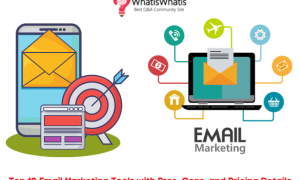Emails are considered one of the most effective marketing channels to expand a brand’s reach to the target audience and personalise messages based on the subscriber’s data and their past shopping behaviour.
In such a scenario, joining an email marketing course is extremely beneficial for candidates who want to master the art of creating, optimising, personalization and targeting market campaigns. By keeping track of regular visitors that visit a brand’s website or landing pages, most online businesses escalate engagement rates with potential customers via email marketing.
Why is It Important to Draft an Email Marketing Strategy for your Business?
An efficient email marketing strategy promotes customer acquisition and retention. Constantly re-engaging with customers aids the brand in gaining customer trust and ultimately helps in driving sales. A higher number of interested consumers on your email list not only amplifies the chance of potential sales but also supports an organisation’s endeavours of affiliate marketing.
What are the Advantages of Learning Email Marketing?
Out of the uncountable benefits of enrolling in an email marketing-certified course, some of the major ones are as follows:
Extended Reach to A Larger Audience
Email marketing reaches a large number of people at once, without the need for expensive advertising campaigns.
Build Relationships with Customers
Emails help in establishing long-term relationships that can lead to increased loyalty and repeated business.
Increase Sales
Effective promotion of products and services taking the help of creative email ideas, retargeting customers with discounts along with collaboration emails encourages conversions.
Measure Success
Keeping track of key metrics involved in email marketing such as open rates, conversion rates, click-through rates and quality scores helps you optimise the email content for better results.
Converting Patrons Into Brand Advocates
The exercise of connecting with a brand’s regular customers, winning their trust and targeting those customers that share similar interests is an added advantage of email marketing.
What will A Candidate Enrolling in An Email Marketing Training Institute Get to Explore?
A learner at the email marketing institute will acquire knowledge of various domains in email marketing along with the existing email prevailing options. The most important domains are as follows –
Email List Building
Building a list of email addresses that aid you in connecting with shoppers for the right purposes. This involves email segmentation and driving lead generation via emails.
Email Designing
A predetermined format enhances the reach of customers and generates their interest in visiting the business landing pages. The process of framing the content of an email as well as finalising the design necessitates the use of a variety of elements, themes and graphics to keep the reader hooked till the end of the email.
Email Writing
Writing an email involves creating captivating, catchy phrases and welcoming subject lines as per the email format (formal or informal). Crafting an impactful subject line, preparing the mail body as well as personalising messages according to the target audience, are all activities that come under the broadhead of email writing.
Email Delivery
Before sending emails to a receiver the process of validating the email, verifying the receiver’s address and removing spam is a prerequisite. Moreover, ensuring emails get delivered to the inbox rather than landing in the spam folder is also the responsibility of the organisation’s email marketing manager.
Targeted Email Marketing
Marketing campaigns are usually rolled out to engage a niche-specific audience based on past impressions received. Targeted email marketing involves reinforcing the impact via email personalisation which involves creating engaging and persuasive messages.
Email Automation
Email automation involves sending an automated generated email or a sequence of emails after the visitors perform a specific action. Various email automation tools like ESP, CRM, A/B testing tools and many more are used to streamline, scale and automate the process of email marketing.
Major Tools that a Marketer Will Learn in Email Marketing Classes
The exercise of email marketing necessitates sending emails to the concerned person at the appropriate time. The entire cascade of email marketing tools that prove to be handy in this process is inclusive of
ESP (Email Service Provider) Tool
ESP tool is software that enables its users to send bulk emails to the subscribers while making it easier for them to manage the subscriber list.
Apart from this, the ESP tool helps keep track of the performance of the marketing campaigns. Hubspot, Mailchimp, Sendinblue & Mailjet are some of the most popular ESP marketing tools used by major organisations.
CRM (Customer Relationship Management) Tool
A CRM tool helps manage customer data such as contacts, email addresses and the total number of orders, taking note of recurring issues, customer reviews and how their current activities impact a customer’s buying behaviours.
The information collected using CRM tools such as Salesforce, Hubspot, and Zoho allows the users to forecast upcoming orders. This information gathered likewise helps you segment the audience, personalise your emails and improve the targeting behaviours.
Email Verification Tool
This tool helps organisations in identifying whether the recipient’s email address is valid or not. NeverBounce, Kickbox, and ZeroBounce are a few verification tools that assist the email marketing manager in crossing off the misleading email addresses in the sender’s list.
An email verification tool also ensures that the emails get delivered to the inbox of your recipients rather than the spam folder.
A/B Testing Tool
This tool helps draw comparisons between content pieces, themes and various email formats. A/B testing tool allows the user to decide which content will perform better or which format is more impactful.
This tool allows you to test different variations of your email campaigns and determine which one performs better. A/B Testing Tool allows testers to optimise the subject lines, the email copy and a clear call-to-action.
Email Retargeting & Analytical Tools
The strategy behind email retargeting is re-engaging with customers to make them reconsider the deal or know all about the ongoing offers. The use of analytical tools for email retargeting helps in curating content in a personalised manner based on past impressions received. Analytical tools help track opens, clicks, conversions and other key metrics involved in email retargeting.
How Do Email Marketing Courses Provide Extended Support to Diverse Digital Marketing Strategies?
An email marketing tutorial for beginners will always help a candidate master the following activities –
- Segment the email list before sending emails.
- Establish a connection and build trust by personalising recipients by name and tailoring your messages according to their interests and needs.
- Create compelling subject lines that pique their reader’s interest.
- Email marketing involves creating user-engaging content using visuals and mastering the art of storytelling.
- Optimise your emails for mobile which involves creating a responsive design that adapts to different screen sizes and display’s your message in an easy-to-read manner.
Wrapping It All Up
Considering the whole picture, email marketing strategies enhance the reach and help target potential customers effectively. Taking all factors into account like a streamlined curriculum and avant-garde tech infrastructure, the foremost institute we would like to recommend to all aspirants is Ubuy Academy. It is regarded as one of the “Best Email Marketing Institute” that extends placement opportunities to all the applicants who successfully complete their course.





Leave a comment